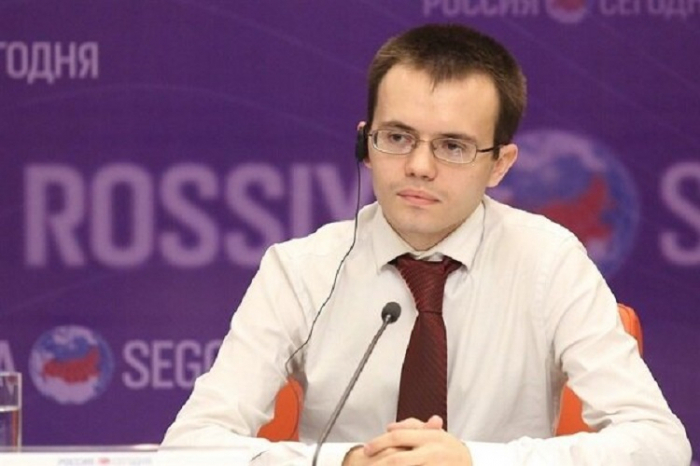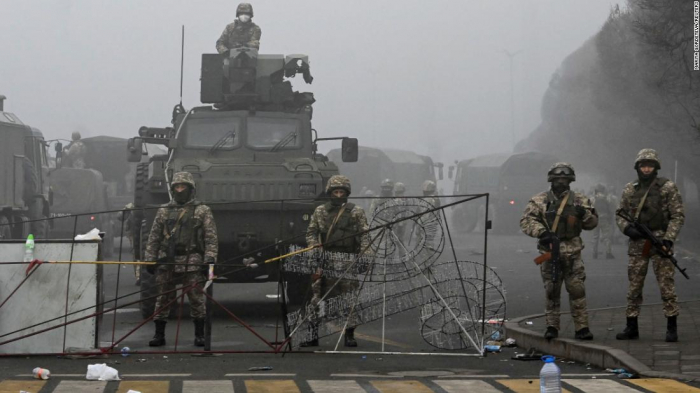What had initially been apolitical anti-reform protests against the Kazakh government’s preplanned removal of fuel subsidies were hijacked by radical forces into a terrorist-driven regime change campaign. Curiously, this happened immediately after the first-mentioned movement received everything that they wanted following the government’s resignation and its reimposition of price controls, the latter of which was also extended to other social commodities and utilities. This suggests that radical forces planned to exploit the predictable protests that the fuel subsidies’ preplanned removal provoked in order to serve as a cover for their violent regime change campaign.
The detainment of former Prime Minister and head of the National Security Committee Karim Massimov alongside several unnamed individuals a few days ago on suspicion of treason suggests that some elements of the elite might have colluded with terrorists in their attempted takeover of the state. It remains to be seen whether that’s the case with that particular figure or not but the news that he was detained adds credence to that speculation. After all, it’s difficult to imagine that the over 20,000 armed and highly trained sleeper cell terrorists that President Tokayev claimed had attacked Almaty alone could have infiltrated the country so extensively without the security services knowing about it.
The constitutional order of the state was on the verge of collapse when President Tokayev requested that his CSTO allies immediately launch a limited peacekeeping operation aimed at securing strategic facilities across the country. Russia and the others quickly agreed, which decisively reversed the strategic dynamics and saved Kazakhstan. The local security forces were able to fully concentrate on anti-terrorist and law-and-order activities after their allies helped them secure strategic sites across the country whose safety was required for the state to continue functioning. A potentially catastrophic regional security crisis was therefore narrowly averted through this decisive intervention.
Kazakhstan’s civil society had already been deeply infiltrated by US-led Western “NGOs”, including government-organized ones or GONGOs, despite recent attempts to curtail their influence and regulate their activities following the model pioneered by Russia. These organizations cultivated anti-state sentiment and might have also recruited the Color Revolution cadre for participating in unauthorized (illegal) rallies as well as managing other networks of influence within that geostrategically positioned country.
Having explained that, however, it’s unclear to what extent these groups’ foreign intelligence patrons played a role in orchestrating the latest spree of urban terrorism. Kazakhstan practices a balanced foreign policy whereby it actively multi-aligns between various powers, including Western ones with whom it has excellent economic ties. While cynics suspect that the US simply wants to sow chaos wherever it can and especially on Russia’s and China’s doorsteps, the argument can also be made that it’s also sincerely interested in responsibly regulating its rivalry with the first-mentioned of those two.
This is evidenced by US President Joe Biden’s meeting with Russian President Vladimir Putin in Geneva last summer, their two phone calls last month, and the security talks that they’re having this week on de-escalating the undeclared US-provoked missile crisis in Europe. The American administration’s predominant anti-Chinese faction in its permanent military, intelligence, and diplomatic bureaucracies (“deep state”) wants to reach a deal with Russia in Europe in order to enable the Pentagon to redeploy some of its forces from there to the Asia-Pacific for more aggressively “containing” China.
This grand strategic goal goes against their anti-Russian rivals’ ideological agenda, which regards Russia and not China as the US’ top strategic adversary in the 21st century. This subversive faction might have played a role in exacerbating the latest events by ordering the transformation of the successful anti-reform Color Revolution (that they’d been plotting for a while after expecting the government’s preplanned removal of fuel subsidies to provoke protests) into an Unconventional War despite the first-mentioned movement having achieved its goal of pressuring the state into making concessions.
To elaborate a bit more, the US’ anti-Russian “deep state” faction might have done this as a desperate last-ditch effort to provoke a crisis in the run-up to this week’s US-Russian security talks in Europe in the hopes that they’d sabotage this process by getting one or the other to overreact, politicize the discussions, and then pull out of them. If that was the goal, then it completely failed, but it would explain the curious transformation of a successful anti-reform Color Revolution into a terrorist-driven Unconventional Warfare of regime change.
In other words, there’s a high possibility that foreign intelligence forces – particularly the US’ subversive anti-Russian “deep state” faction – played a role in externally exacerbating this long-planned Color Revolution despite there being no rational reason to do so after it succeeded. Moreover, the timing suggests that this unexpected intensification was meant to derail the upcoming US-Russian security talks. That’s not even to mention the role that some foreign terrorists reportedly played in the latest events as well as the anti-state preparations (informational and organizational) by some “NGOs”.
 Andrew Korybko is a Moscow-based American political analyst specializing in the relationship between the US strategy in Afro-Eurasia, China’s "One Belt One Road" global vision of New Silk Road connectivity, and Hybrid Warfare.
Andrew Korybko is a Moscow-based American political analyst specializing in the relationship between the US strategy in Afro-Eurasia, China’s "One Belt One Road" global vision of New Silk Road connectivity, and Hybrid Warfare.
AzVision.az
More about: Kazakhstan
















































